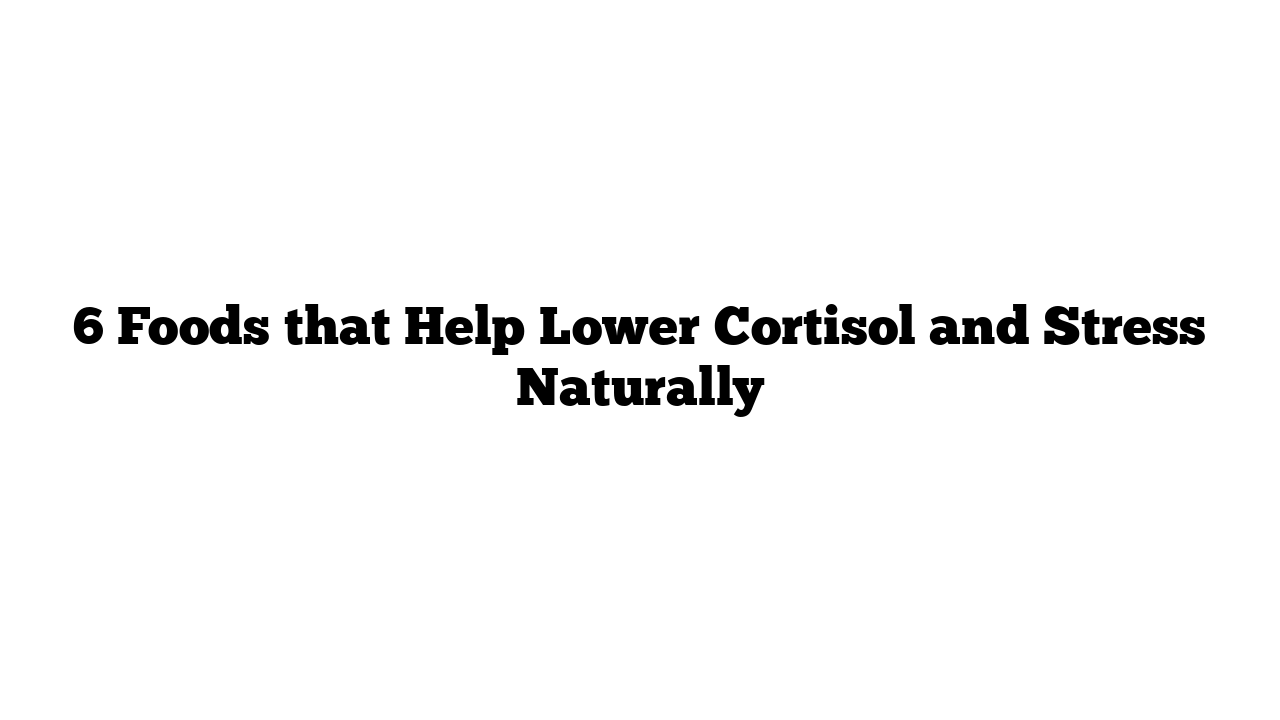Stress is something we all deal with, but did you know that the foods you eat can have a major impact on your cortisol levels? Cortisol is known as the “stress hormone” and plays a big role in how our body responds to stress. It’s vital to manage cortisol effectively because too much can lead to a range of health problems, including anxiety, sleep issues, and even weight gain. Today, we’re going to focus on six foods that help lower cortisol naturally, improve your stress response, and enhance overall wellness.
What Is Cortisol?
Cortisol is a hormone released by the adrenal glands in response to stress. Both physical and mental stress trigger the release of cortisol, which works in tandem with adrenaline to prepare the body to deal with stress. While this was once useful for escaping danger (like running from a tiger), modern-day stressors (work, family, etc.) can cause long-term elevation of cortisol levels, which harms your health.
6 Foods That Can Help Lower Cortisol
1. Leafy Green Vegetables
Leafy greens like spinach, kale, and swiss chard are packed with potassium and magnesium—two minerals that help relax the body and regulate cortisol. These minerals are especially helpful in replenishing what stress can deplete. You can get a double dose of benefits by consuming these greens in a salad or in a healthy keto-style meal.
2. Eggs
Egg yolks are a great source of choline, a nutrient essential for the production of acetylcholine, a neurotransmitter that supports your parasympathetic nervous system (the part of your body responsible for “rest and digest”). This can help lower cortisol and improve overall relaxation. Eggs also contain B vitamins, which are essential for nervous system function.
3. Fatty Fish (Salmon, Mackerel)
Fatty fish like salmon and mackerel are not only rich in healthy fats but also provide a good amount of vitamin D. Since vitamin D plays a similar role to cortisol in regulating stress and inflammation, ensuring you have adequate levels can help keep cortisol in check. If you’re not getting enough vitamin D from sunlight, these fatty fish can be a great dietary addition.
4. Probiotic-Rich Foods
Gut health and stress are closely linked, with the vagus nerve connecting your digestive system to your brain. Eating probiotic-rich foods like kefir, kimchi, sauerkraut, and pickles can support your parasympathetic nervous system and help you feel calmer. Probiotics help restore balance to your gut microbiome, which can improve mood, sleep, and overall stress response.
5. Nutritional Yeast
Nutritional yeast is a powerhouse food that contains B1 and B5, two vitamins that help produce acetylcholine, supporting your body’s relaxation response. Adding nutritional yeast to meals can help lower cortisol and promote a more balanced, calm state. It’s especially useful when combined with healthy fats like olive oil or avocado.
6. Dark Chocolate
Good news for chocolate lovers: dark chocolate (preferably with a high cocoa percentage) has been shown to lower cortisol levels. It contains flavonoids and antioxidants, which help reduce stress and improve mood. Just a small amount (around 1 ounce) can have a positive effect on reducing cortisol without overloading on sugar.
Foods to Avoid: Sugar and Starches
While certain foods can help lower cortisol, others, like sugars and starches, can spike cortisol levels. These foods keep your body in a state of stress by triggering the sympathetic nervous system. To optimize your cortisol levels, it’s best to reduce sugar and starch intake, focusing instead on whole, nutrient-dense foods that support a calm, balanced nervous system.
Other Ways to Lower Cortisol
In addition to eating the right foods, other methods like fasting, stress management techniques, and getting enough sleep can help further regulate cortisol. A ketogenic diet, for example, can help balance cortisol by shifting your body into a state that promotes rest and recovery. Additionally, ensuring you’re getting enough vitamin B12, magnesium, and vitamin D supports the body’s natural ability to manage stress.
To continue your health journey, check out more tips and information at Medicaltimes.io.
FAQs
Q1: How do I know if my cortisol levels are too high?
A: Symptoms of high cortisol include fatigue, irritability, sleep disturbances, and weight gain around the midsection. A blood test or saliva test can measure cortisol levels, but indirect methods like monitoring heart rate variability can also provide insight.
Q2: Can I lower cortisol quickly with foods?
A: While eating the right foods can help, it’s important to manage overall stress and lifestyle factors like sleep and physical activity. Consistency in making healthier choices will lead to lasting results.
Q3: Are there any risks to taking vitamin D supplements for cortisol?
A: Vitamin D supplements are generally safe when taken as recommended. If you’re concerned about toxicity, it’s best to consult with your healthcare provider before starting supplementation.
